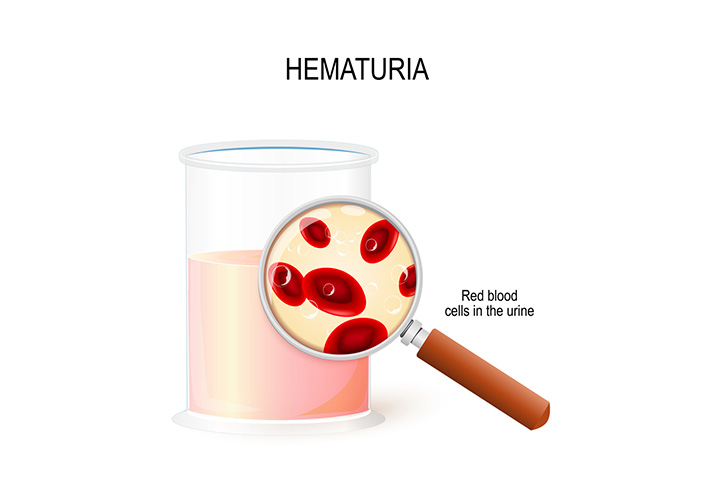image: iStock
Red blood cells are usually not seen in the urine since they are filtered in the kidneys. However, in some cases, abnormalities in the functioning of the kidneys and the unitary tract system can lead to blood or erythrocytes (red blood cells) in the urine, a condition called Hematuria.
Hematuria is common in children and is often diagnosed during routine urinalysis. Although various conditions can cause blood in urine, most cases are benign and can be treated.
Read this post to learn about the types, causes, risk factors, signs and symptoms, diagnosis, prevention, and treatment options for hematuria in children.
Types Of Hematuria
Hematuria can be of two types, namely microscopic hematuria and gross hematuria (1)
- Microscopic hematuria is not visible to the naked eye and is usually detected via microscopic examination of the urine, generally during urinalysis, to diagnose the causes of urinary symptoms. This may often resolve without treatment and may not cause any signs and symptoms in some children.
- Gross hematuria is visible to the naked eye. Urine may appear red or tea- or cola-colored. This can be with or without symptoms and is usually not painful. Children may complain of pain if they pass blood clots in the urine or if other signs and symptoms accompany hematuria.
Microscopic hematuria is often not a cause for concern in healthy children. However, doctors may recommend diagnostic tests if the child has high blood pressure, proteinuria (proteins in the urine), or chronic kidney diseases.
Risk Factors And Causes Of Hematuria In Children
Blood or red blood cells may leak into the urine due to abnormalities in the kidney or any other urinary system parts, such as the bladder and urethra. The following conditions are some of the common causes of hematuria in children (1) (2) (3):
1. Bladder infections (cystitis)
2. Kidney infections (pyelonephritis)
3. Injury or trauma to the kidneys or another part of the urinary system
4. Certain medications such as some OTC pain relievers, blood thinners (heparin, warfarin) and sulfa-containing drugs, penicillins, and cyclophosphamide (Cytoxan)
5. Strenuous exercise
6. Abnormal urinary tract structures such as cysts (fluid-filled sacs) in the kidneys
7. Inherited diseases such as Alport’s syndrome, inherited nephritis, polycystic kidney disease, and sickle cell disease
8. Kidney stones and mineral imbalance in the urine, such as high levels of calcium
9. Glomerulonephritis — inflammation of the glomeruli, the filtering units of the kidneys
10. Post infectious glomerulonephritis (PIGN) — kidney inflammation after a viral or bacterial infection.
11. Familial idiopathic hematuria — when blood in urine is present without any specific cause, which may often run in families.
12. Hemolytic uremic syndrome (HUS), which may result from inflammation of the small blood vessel and injury in the kidneys
13. Bladder or kidney tumors
14. Bleeding disorders such as hemophilia and Von Willebrand’s disease
Children who had a recent kidney infection or are under certain medications are at an increased risk for hematuria. Also, children with a positive family history of hematuria and kidney disease have a higher risk than others. Runners and joggers may also be more prone to hematuria than other athletes.
Signs And Symptoms Associated With Hematuria
Hematuria is not a disease in itself and is often a sign or indication of underlying conditions. It may not cause specific signs and symptoms in many children. However, in some cases, painful urination can be seen in children with blood clots in the urine or those whose urine flow is blocked.
The signs and symptoms associated with hematuria may vary depending on the underlying causes, including (3)
- Periorbital and lower extremities edema (swelling)
- Reduced urination
- High blood pressure
- Fever
- Chills
- Flank and abdominal pain
- Nausea and vomiting
- Frequent urination
When To See A Doctor?
All children with gross hematuria require medical evaluation. You may consult the pediatrician if your child manifests the following.
- Urinary symptoms such as painful urination and belly or flank pain
- Fever
- Swelling
- Oliguria (decreased urine production)
- Lethargy
- Headaches
- Irritability
- Joint pain
- Skin rashes
- Bleeding from any part of the body
- Strenuous exercise-related hematuria
Diagnosis Of Hematuria
Diagnosis of hematuria usually begins with physical examination and a review of the child’s family history. The following tests are ordered in children with blood in urine to identify the underlying cause (1) (4).
- Urine tests are done to look for blood in the urine. Calcium, proteins, and creatinine levels are also evaluated during urinalysis.
- Kidney ultrasound may help visualize the kidney structures.
- Blood tests may help determine signs of infections, kidney function, and other factors.
- Kidney biopsy may be done for children with microscopic hematuria who have proteinuria, a family history of kidney diseases, and high blood pressure.
- Urine tests are done for several months in children who have microscopic hematuria with normal kidney function.
- CT scan with contrast may help visualize the kidneys and ureters and help diagnose bladder abnormalities.
- Cystoscopy, in which a flexible telescope is inserted through the urethra and into the bladder, to look for bladder and urethra abnormalities, may be done.
Doctors may also order additional tests to identify the underlying cause depending on the initial results or symptoms. A genital examination may also be done to exclude the chance of bleeding from the genital system.
Treatment For Hematuria
The treatment options for hematuria may vary depending on the underlying causes (5).
1. Urolithiasis (stones): Adequate fluid intake is recommended to move the stones in initial management. Urine alkalinization for uric acid stones and urine acidification for calcium phosphate stones are done in the next step. Pain relievers and medical therapy are often prescribed. Larger stones may be removed via lithotripsy or surgery.
2. Genetic disorders: Supportive treatments to relieve the symptoms are given for genetic disorders, such as Alport syndrome, since there is no cure. ACE inhibitors and ARB blockers are usually prescribed to manage hypertension and proteinuria.
3. HUS: Hemolytic uremic syndrome in children is managed with supportive care, such as blood transfusion. Fluid and electrolyte balance is also maintained via the parenteral and enteral routes. Hemodialysis (renal replacement therapy) may be required in severe cases.
4. UTIs: Urinary tract infections (UTIs) are treated with antibiotic therapy. Trimethoprim-sulfamethoxazole or first-generation cephalosporin therapy is often prescribed, and hydration is maintained with IV fluids in most cases.
5. PIGN: Post-infectious glomerulonephritis (PIGN) is treated with antibiotic therapy and salt restriction with or without fluid restriction. Loop diuretics are also often prescribed.
6. Bleeding disorders: These are treated with infusions of fresh frozen plasma or clotting factors.
7. Kidney and urinary tract injuries: Traumatic injuries are managed depending on the location and severity. Severe trauma may require surgical management.
8. Tumor growths: Urinary system cancer and tumor cases are referred to oncologists, and treatment is based on the type and location of the growth. Surgical removal, chemotherapy, radiotherapy, etc., are done accordingly.
Some conditions causing hematuria can be self-limiting, and doctors may not prescribe any specific medications. The child may receive adequate hydration and rest until the cause resolves. You may discuss with the pediatrician to know the management plan for hematuria in your child.
How To Prevent Hematuria In Children?
Not all cases of hematuria are preventable. However, adequate fluid intake may help prevent kidney stones and urinary tract infections in some children. Maintaining good hygiene may also reduce the risk of certain diseases. Salt restrictions can be helpful in certain conditions.
In most cases, hematuria in children can be due to infectious causes. Seeking appropriate treatments may help resolve this condition. You may follow the recommended diagnostic tests to determine the exact cause of hematuria in your child since the management may vary depending on the cause. Never hesitate to do the follow-up urinalysis even if your child has microscopic hematuria without symptoms.


































